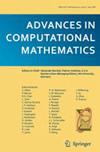Weights for moments’ geometrical localization: a canonical isomorphism
IF 2.1
3区 数学
Q2 MATHEMATICS, APPLIED
引用次数: 0
Abstract
This paper deals with high order Whitney forms. We define a canonical isomorphism between two sets of degrees of freedom. This allows to geometrically localize the classical degrees of freedom, the moments, over the elements of a simplicial mesh. With such a localization, it is thus possible to associate, even with moments, a graph structure relating a field with its potential.
力矩几何定位的权重:典型同构
本文涉及高阶惠特尼形式。我们定义了两组自由度之间的典型同构。这使得经典自由度--矩--可以在简单网格的元素上进行几何局部化。有了这种局部化,就有可能将一个场与其势相关联的图结构(甚至与力矩相关联)联系起来。
本文章由计算机程序翻译,如有差异,请以英文原文为准。
求助全文
约1分钟内获得全文
求助全文
来源期刊
CiteScore
3.00
自引率
5.90%
发文量
68
审稿时长
3 months
期刊介绍:
Advances in Computational Mathematics publishes high quality, accessible and original articles at the forefront of computational and applied mathematics, with a clear potential for impact across the sciences. The journal emphasizes three core areas: approximation theory and computational geometry; numerical analysis, modelling and simulation; imaging, signal processing and data analysis.
This journal welcomes papers that are accessible to a broad audience in the mathematical sciences and that show either an advance in computational methodology or a novel scientific application area, or both. Methods papers should rely on rigorous analysis and/or convincing numerical studies.

 求助内容:
求助内容: 应助结果提醒方式:
应助结果提醒方式:


